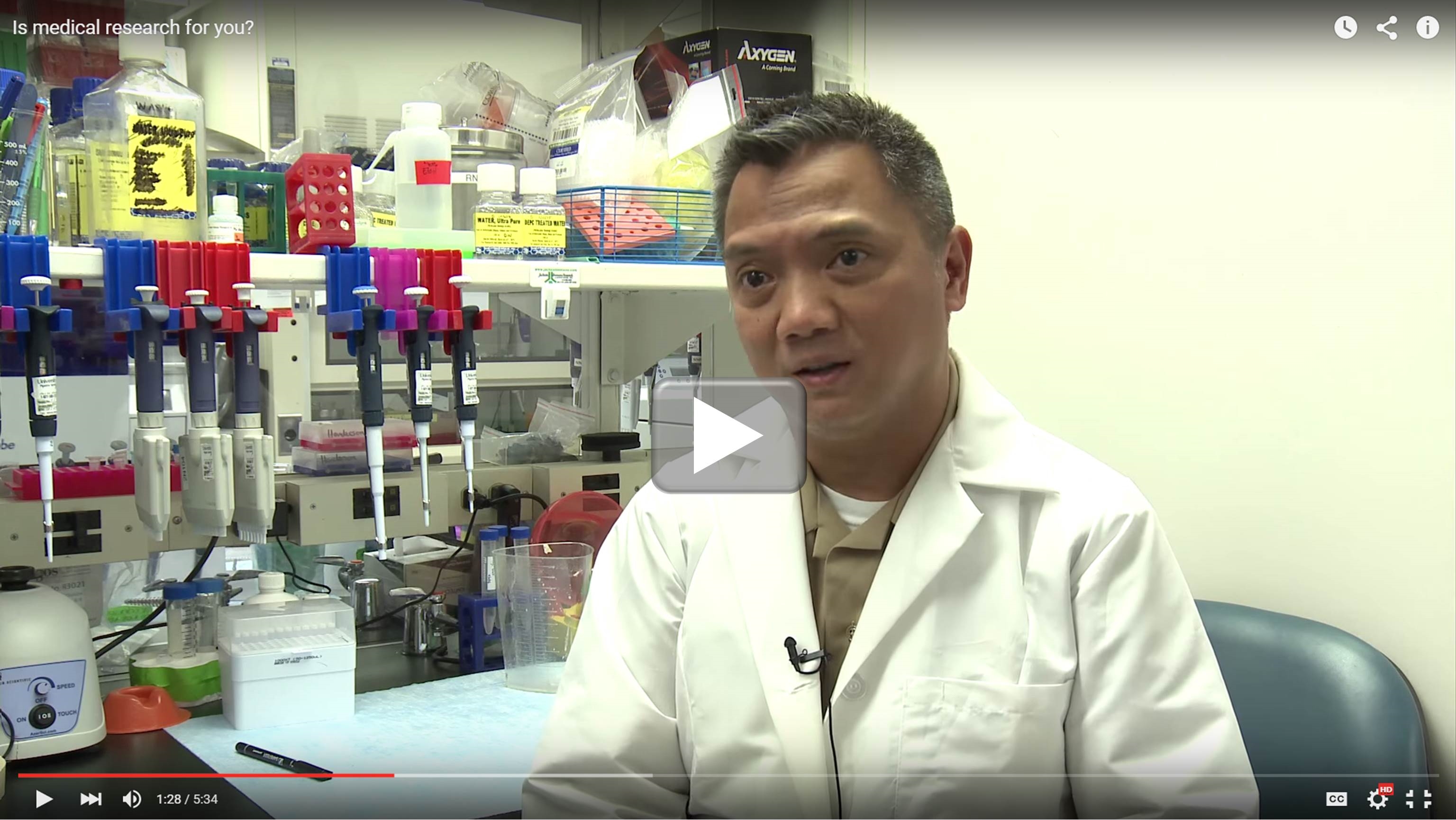LabTV: Curious About Fatigue Related to Cancer Therapy
Posted on by Dr. Francis Collins
As this LabTV profile of an outstanding nurse-scientist shows, there are many different paths to a career in biomedical research. Leorey Saligan grew up in the Philippines, where the challenges and rewards of caring for sick family members inspired him to become a nurse. His first job was at a nursing home in Midland, TX, and the next at a nearby hospital. Later, Saligan moved to Norfolk, VA, where as a nurse practitioner he began caring for people with sarcoidosis, an inflammatory disease that affects several organ systems.
Saligan went on to pursue a Ph.D. in nursing at Virginia’s Hampton University, writing his dissertation on the chronic vision problems associated with sarcoidosis. To gather more data on such problems, he joined NIH’s National Institute of Nursing Research in Bethesda, MD, and, with the help of colleagues, carried out a clinical study. To Saligan’s surprise, the data showed that fatigue, rather than poor vision, was the top concern of people with sarcoidosis. That discovery sparked his research interest in fatigue—an interest now focused on the intense, often debilitating fatigue that many people with cancer experience both during and after treatment, particularly radiation therapy.
Like people with sarcoidosis, people undergoing cancer treatment report that fatigue is the symptom that most negatively affects their quality of life. Many find the fatigue so distressing that their treatment regimens have to be reduced or even halted—actions that may have a negative effect on the cancer-killing power of such treatments. And, for some folks, the fatigue can be long lasting, persisting for months or even years after cancer therapy ends.
By analyzing blood and tissue samples donated by volunteers who are undergoing or who have undergone cancer treatments, Saligan and colleagues from NIH’s Clinical Center and National Cancer Institute have uncovered several promising leads in their effort to gain a better understanding of the molecular mechanisms of treatment-related fatigue. He is also working with behavioral researchers to explore the relationship of fatigue with pain, depression, anxiety, sleep disturbances, and other symptoms. Ultimately, this NIH tenure-track investigator (who also happens to be an officer in the U.S. Public Health Service) wants to see this scientific knowledge translated into effective ways of treating or preventing the fatigue that is a most unfortunate side effect of potentially life-saving cancer therapies.
Links:
Leorey N. Saligan (National Institute of Nursing Research/NIH)
Investigating Molecular-Genetic Correlates of Fatigue Experienced by Cancer Patients Receiving Treatment (ClinicalTrials.gov/NIH)
Effect of Ketamine on Fatigue Following Cancer Therapy (ClinicalTrials.gov/NIH)
Science Careers (National Institute of General Medical Sciences/NIH)
Careers Blog (Office of Intramural Training/NIH)


What I find equally amazing is the fatigue induced by primary pancreatic tumors that are small, yet the effect is systemic and precedes any kind of treatment. Indeed, it is a common symptom that is a sign of the cancer presence.
I find the muscle inflammation connection with fatigue interesting. Has anyone looked at whether regular exercise during cancer treatment makes a difference in the level of inflammation and, thus, fatigue? Leorey’s comment about finding the inflammation rang a bell for me, given my personal experience with cancer and fatigue.
When I was diagnosed with TNBC and SLL last December, my surgeon advised me to exercise at least 30 minutes a day, five days a week — even when I didn’t feel like I could. I got a recumbent bike and followed the doctor’s orders, upping it to seven days a week when I got halfway through my four-month chemo regimen and throughout the seven-week radiation course. I did get so tired during radiation that I had to take a daily power nap, and I still have occasional periods of fatigue two months after treatment ended. However, the fatigue has been mild enough that I’ve been able to work full-time throughout this whole ordeal. Several oncologists I regularly interview were amazed that I’ve been able to keep up with my work schedule without any sick days. My provider has chalked it up to the exercise.
I heard that spending some time with yourself alone causes the body to relax, release tension, and relieve stress which is one of the causes of cancer – but a lot of scientists will refute this claim. But, sometimes we cannot help but think that the body reacts to stress in a way to preserve itself; however, also, in the process, causes it to produce effects that cause cancer.
Yoga and reflection in daily life, spending sometime alone with oneself can provide great benefit especially to those who are suffering. If the end game is really death, might as well, try all the alternative things that can be done to try to prolong life even just for a little bit. . .